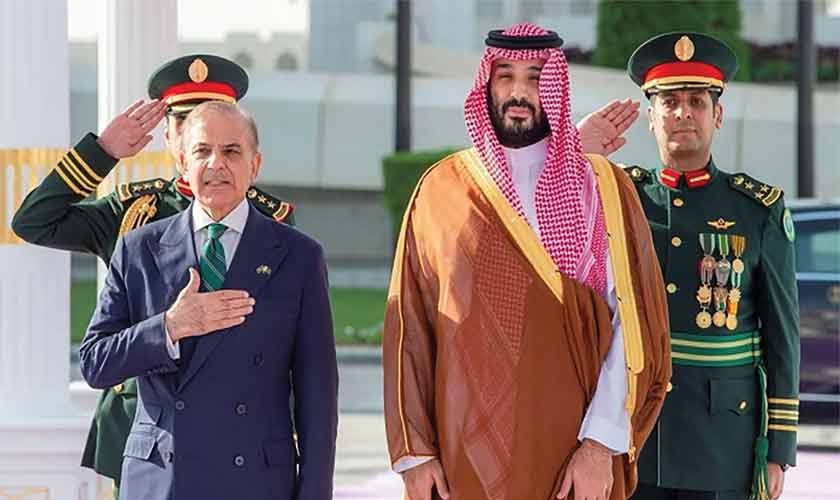**Saudi Arabia and Pakistan Sign Strategic Mutual Defence Agreement: A New Chapter in Regional Geopolitics**
On September 18, Saudi Arabia and Pakistan signed a Strategic Mutual Defence Agreement pledging that any attack on either nation will be considered an attack on both. Prompted by Israel’s attack on Qatar, this pact reflects a strategic pivot away from traditional Western security guarantees, which many now view as unreliable.
Hailed as a historic milestone, the agreement establishes a reciprocal defence framework, committing both countries to help each other counter foreign aggression. This alliance signals a transformative shift in regional geopolitics, projecting solidarity between two key Muslim nations.
### Will the Pact Result in Automatic Military Support?
A key question arises: does this agreement guarantee automatic military support whenever either nation is threatened? Such pacts are best understood through historical context.
Pakistan’s history of strategic alliances—such as its Cold War involvement in US-led arrangements like SEATO and CENTO—did not lead to guaranteed military support during its wars with India in 1965 and 1971. Ambassador Naghmana Hashmi noted Pakistan’s history of strategic restraint, citing its decision not to deploy troops in the Korean War to avoid confrontation with China, or its refusal to join the 2015 Saudi-led intervention in Yemen.
Given Riyadh’s growing ties with New Delhi, Saudi Arabia’s support in a potential India-Pakistan conflict would likely be diplomatic or economic rather than military. Saudi trade volume with India is reportedly 10-14 times larger than with Pakistan, providing Riyadh significant economic leverage to deter aggression.
Analyst Michael Kugelman observes that while the agreement may not deter India’s aggressive policies, it strengthens Pakistan’s position. Support from Saudi Arabia, China, and Turkey enhances Pakistan’s strategic standing, potentially encouraging India to reconsider regional strategies to avoid economic repercussions.
Thus, the political significance of this pact arguably outweighs any immediate military utility. It reassures Saudi citizens of Pakistan’s support, warns Israel and other regional actors that Saudi Arabia is not isolated, and nudges the United States to take Gulf security concerns more seriously.
As former Foreign Secretary Salman Bashir explains, “This is fundamentally a strategic political gesture and a deterrent signal, rather than an operational blueprint for military integration.”
### The Pact Within Saudi-US Relations
For some time, Riyadh has sought a US defence pact and nuclear cooperation as leverage for normalising ties with Israel. However, progress stalled amid the Gaza conflict.
Salman Bashir emphasizes that this agreement does not mark a departure from Saudi Arabia’s longstanding security partnership with the United States. The US remains closely allied with Saudi Arabia and understands the significance of this pact between two of its allies.
The primary purpose of the agreement is to project unity and deter aggression by signalling that an attack on one is an attack on both. It addresses shared threats such as regional instability and terrorism, aiming to prevent conflicts and enhance stability through deterrence.
### Historical Defence Cooperation Between Saudi Arabia and Pakistan
Defence collaboration between the two nations dates back to the 1960s with training agreements. This expanded after the 1979 incident, culminating in Pakistani troop deployments, including a brigade in 1983 and over 20,000 personnel throughout the 1980s.
Pakistan also sent 11,000 troops during the 1990-91 Gulf War. Military cooperation continued with arms purchases and participation in the 2015 Islamic Military Counter-Terrorism Coalition led by a former Pakistani army chief.
This agreement responds to a collapsing regional security framework, particularly following Israel’s attack on Qatar—a non-NATO US ally. The Doha incident exposed the unreliability of American security guarantees, prompting Saudi Arabia to seek alternative alliances.
### Pakistan as a Natural Security Partner
In the Middle Eastern context, many countries lack the capacity to counter Israeli aggression. Pakistan emerges as a practical and credible choice, based not only on its battle-hardened military but also the deep reverence its people hold for the Haramain Sharifain (the two holy mosques in Mecca and Medina).
For Saudi Arabia, the alliance supports Crown Prince Mohammed bin Salman’s domestic transformation agenda.
### Ambiguity on Nuclear Cooperation
The public text of the defence agreement uses general language—focusing on strengthening joint deterrence—without mentioning specific weapon systems or nuclear capabilities. The concept of a nuclear umbrella remains speculative.
Salman Bashir stresses that Pakistan’s nuclear doctrine remains exclusively oriented toward deterring India, with no indication of change. Ambassador Naghmana Hashmi highlights that the agreement maintains flexibility and ambiguity regarding the deployment of strategic assets, especially nuclear weapons.
She notes the precedent of US nuclear weapons deployed in Europe, including non-NPT states, where control remains with the nuclear power. Pakistan, a non-signatory but respectful of the NPT, is unlikely to station nuclear weapons in Saudi Arabia, a signatory to the treaty.
Ultimately, any extension of a nuclear umbrella is uncertain and remains absent from the official text.
### Pakistan’s Role in Middle Eastern Security and Regional Diplomacy
This agreement formally integrates Pakistan into Middle Eastern defence architecture, elevating its status as a regional power alongside its South Asian influence.
However, this role carries risks. Pakistan must exercise strategic caution to avoid entanglement in intra-Arab disputes.
China’s mediation led to a Saudi-Iranian detente, with Iran acknowledging Saudi and Pakistani support during its conflict with Israel. Notably, Saudi Defence Minister Prince Khalid reportedly held urgent talks with Iran’s Supreme Leader to pledge solidarity, and Riyadh successfully lobbied against US-led regime change efforts promoted by Israel.
Following meetings between Iranian officials and Saudi leadership, Islamabad must actively address Tehran’s concerns to maintain diplomatic momentum.
Ambassador Javed Hafiz reaffirmed Pakistan’s long-standing policy of never initiating aggression against Iran and maintaining peaceful border relations despite occasional counter-terrorism operations along the frontier.
### Risks and Repercussions
Ambassador Hafiz warns the pact may make Pakistan a target for Israel. While Israel has historically opposed Muslim nuclear powers—as seen in its attacks on Iraq’s Osirak reactor and attempts against Iran—an attack on nuclear-armed Pakistan could provoke massive retaliation and risk all-out war.
Pakistan must also enhance counter-terrorism efforts, especially after intelligence suggested Israel used Indian agents to facilitate attacks on Qatar and Iran.
If Israel were to contemplate an attack on Saudi Arabia, regional conflict would likely escalate uncontrollably, far beyond recent engagements.
### Pakistan Air Force’s Preparedness Against Israel
The Pakistan Air Force (PAF) has a history of encounters with Israel, including notable victories during the 1967 Six-Day War and the 1973 conflict, where Pakistani pilots flying allied aircraft shot down Israeli jets.
PAF maintains contingency plans against Israeli threats, regularly rehearsing scenarios alongside preparations focused on India.
PAF has successfully foiled several Israeli attempts to strike Pakistan, including aborting air raids using civilian aircraft as cover and deterring possible attacks reaching as far as Afghanistan.
Prior to Pakistan’s 1998 nuclear tests, PAF fighters maintained high alert status and rehearsed high-risk retaliatory strike missions to demonstrate strategic resolve.
Today, integrated air defence systems and missile arsenals permit Pakistan to project power with greater assurance.
### International Reception
Ambassador Hashmi states the pact was signed with tacit approval from both the United States and China.
China views the agreement as stabilising for its Belt and Road Initiative investments, while the US acknowledges Gulf security concerns but would not tolerate alliances threatening Israel’s security.
Moving forward, diplomatic efforts will focus on clarifying expectations and operational limits to manage future crises.
Unless an extreme, direct threat arises, this pact is unlikely to draw either country into military ventures initiated by the other.
### Broader Implications and Future Prospects
The concept of “strategic” now extends beyond nuclear issues to encompass economic and social dimensions aligned with Saudi Vision 2030.
This agreement can merge Saudi financial resources, Pakistan’s skilled workforce, and Chinese technology, potentially leading to joint defence production of systems like Al-Khalid tanks and JF-17 fighters, reducing dependency on Western suppliers.
Such cooperation could catalyse Pakistan’s economic growth, create jobs, and provide vocational training, supporting shared development goals and enhancing regional stability.
By integrating Pakistan into Middle Eastern security frameworks, the pact also pressures global powers, including the US, to prioritise Gulf security, while supporting China’s regional projects.
However, Pakistan must clearly define its operational boundaries to avoid becoming embroiled in Middle Eastern conflicts or becoming a target for Israel and allied Western nations.
—
**In Summary:**
The Saudi-Pakistan Strategic Mutual Defence Agreement is a landmark diplomatic gesture aimed at strengthening regional deterrence, conveying political solidarity, and recalibrating strategic partnerships in the face of evolving threats. While it does not guarantee automatic military intervention, the pact serves as a powerful signal of unity and a deterrent against aggression, with far-reaching implications for Middle Eastern and South Asian geopolitics.
https://www.thenews.com.pk/tns/detail/1346524-strategic-alignment



